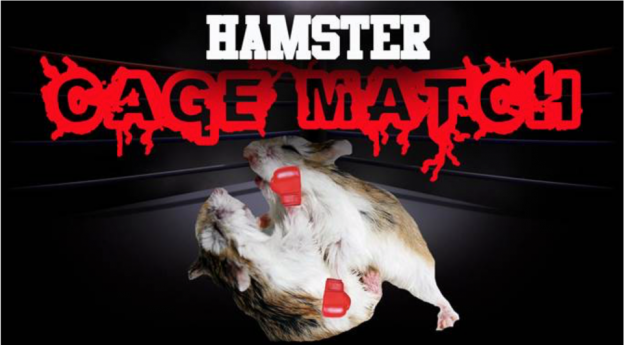Bodybuilders have been fighting the myth of “roid rage” for decades. And now they have an unlikely ally that is spending considerable legal and public relations resources to shut down a research group that is working to prove that anabolic steroids cause aggression in humans.
The People for the Ethical Treatment of Animals (PETA) have set their sights on Professor Richard Melloni and his research team at Northeastern University Department of Psychology in Boston, Massachusetts. Melloni’s research has been restricted to animal models primarily involving hamsters. But he has not hesitated to extrapolate those results to humans.
Melloni’s research team has been attempting identify a neurobiological basis for “roid rage”. Based on the animal data, Melloni has suggested that anabolic steroids cause aggression in humans. And furthermore, anabolic steroids can permanently alter the brain such that steroid users will become and remain more aggressive over the course of their lifetime. In other words, “roid rage” becomes a long-lasting side effect of anabolic steroids that persists long after the discontinuation of steroids.
Obviously, PETA isn’t interested in steroids and aggression in bodybuilders. And PETA couldn’t care less about how this topic is used to demonize and marginalize steroid users. After all, bodybuilders, and particularly steroid-using bodybuilders, as a group are arguably the largest consumers of animal protein in the world.
PETA’s interest in Melloni’s research arises from the fact that Melloni’s team injects hamsters with cocaine and anabolic steroids and forces the animals to participate in cage matches as part of a “twisted sports-style tournament” where there are no rules. Biting is allowed. And injections of steroid-promoting drugs are mandatory. The hamsters have no choice in the matter. The last hamster standing wins.
PETA has decried Melloni’s hamster cage match experiments as “cruel” and “macabre”.
“Since 1996, the experimenters have injected hundreds of animals with steroids, cocaine, and other substances, sometimes drilling into their skulls and injecting the drugs straight into their brains,” according to PETA. “After one hamster is drugged and becomes hyper-aggressive, experimenters put another one, who has not been injected with drugs, into the drugged hamster’s cage, exploiting the animals’ natural tendencies to be solitary and territorial in order to force them to be aggressive in these contrived scenarios.
“Experimenters watch, videotape, and even ‘score’ the ensuing fights, rating the hamsters on criteria including how many times they bite, attack, lunge at, and trap the other animal. They then declare a ‘winner’ and a ‘loser.’”
PETA has sought to put a stop to the hamsters-on-steroids cage fighting since as early as 2015. The animal rights group has had considerable success since then. In September 2017, PETA announced that its lobbying efforts resulted in the complete elimination of government funding for Melloni’s steroid aggression research. The National Institute of Health (NIH) decided to drop taxpayer funding. NIH had previously award grants totaling approximately $3 million to Melloni since 1996.
PETA’s efforts to convince the NIH to drop Melloni was a major victory but PETA has not been content to stop there. PETA is currently trying to convince the Massachusetts Attorney General’s office to file criminal charges against Melloni and his research team.
PETA argued that Massachusetts has strict laws that prohibit animal fighting. Melloni’s research is very clearly in violation of those state laws according to PETA.
“In many of the experiments carried out at the Melloni Aggression Lab at Northeastern University, Melloni and his colleagues purchase hamsters from a commercial breeder, inject anabolic-androgenic steroids (“AAS”) into some of the hamsters, and then introduce these drugged hamsters to naive hamsters in staged fights that are observed, videotapedm and ‘scored’. By keeping and training animals to fight, injecting them with steroids to promote aggression for the fights, and using animals as bait in fighting contests, Melloni and others under his direction are in direct contravention of Massachusetts’ statutes against fighting animals and cruelty to animals.”
PETA has asked Massachusetts Attorney General Maura Healy to file criminal charges against Melloni and his students. It is likely a long shot for PETA. But if Melloni and his alleged co-conspirators are convicted, they face a maximum of 5 years in prison and a $1,000 fine.
PETA has asked individuals who support this action to contact Northeastern University officials and the Massachusetts’s State Attorney General’s Office to let their feelings be known.

